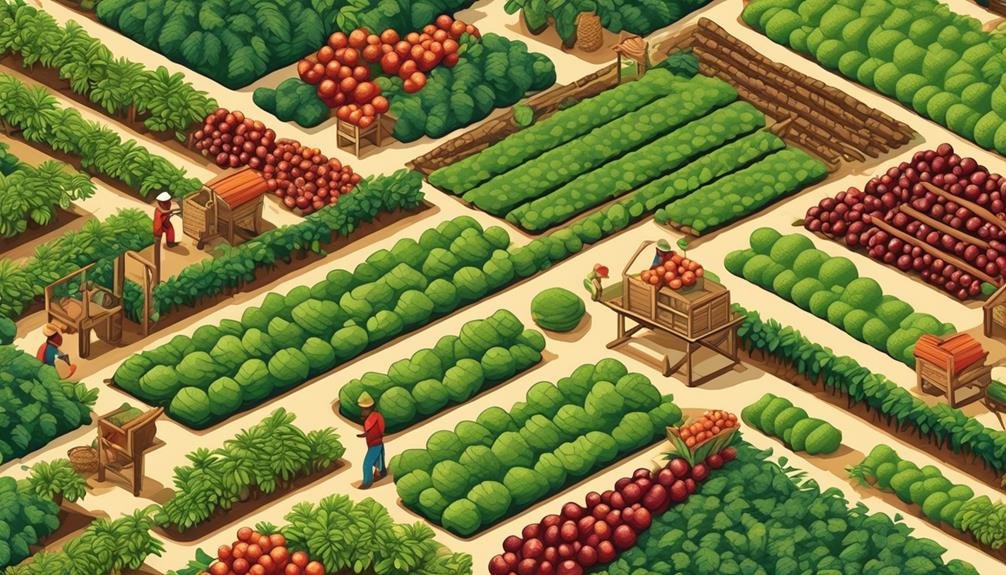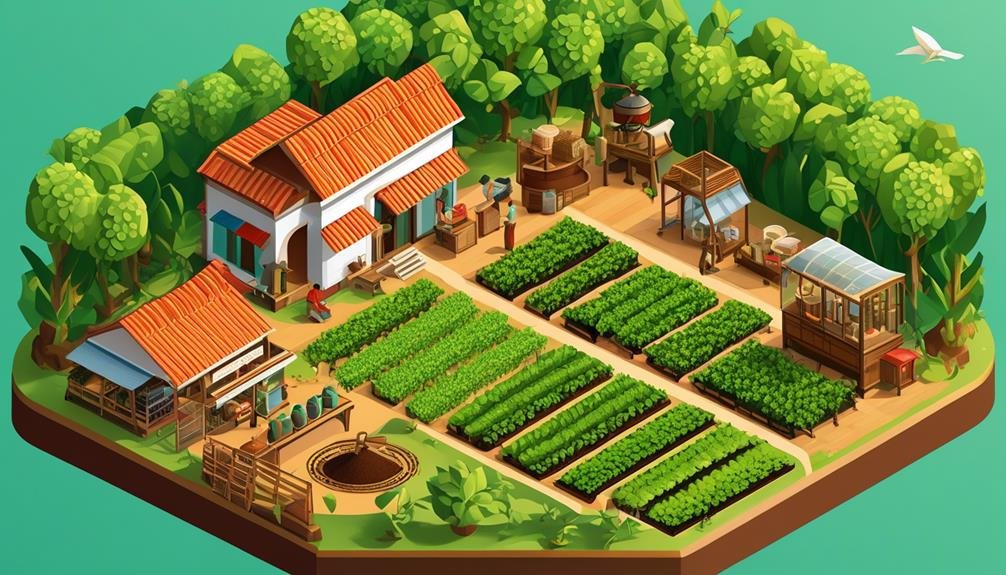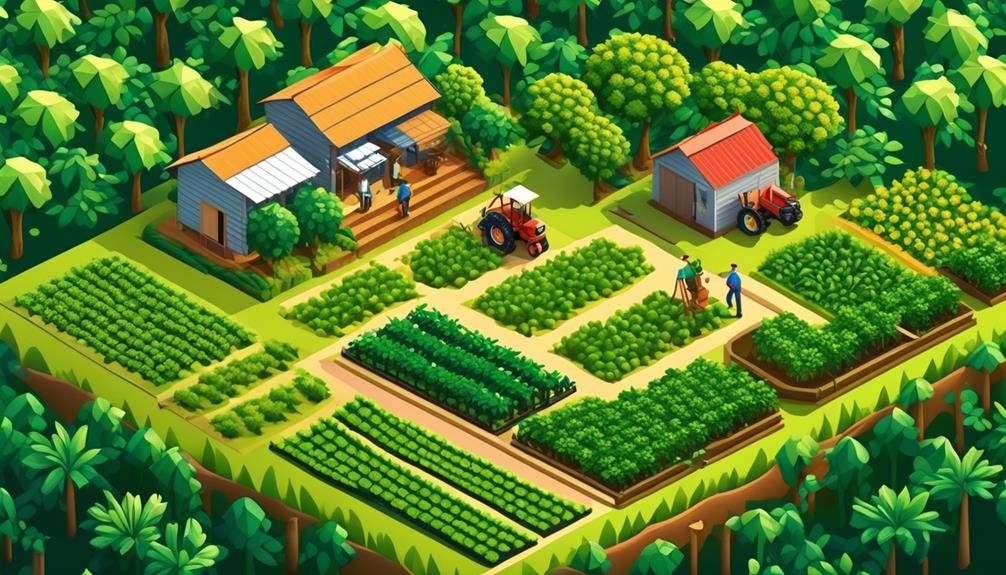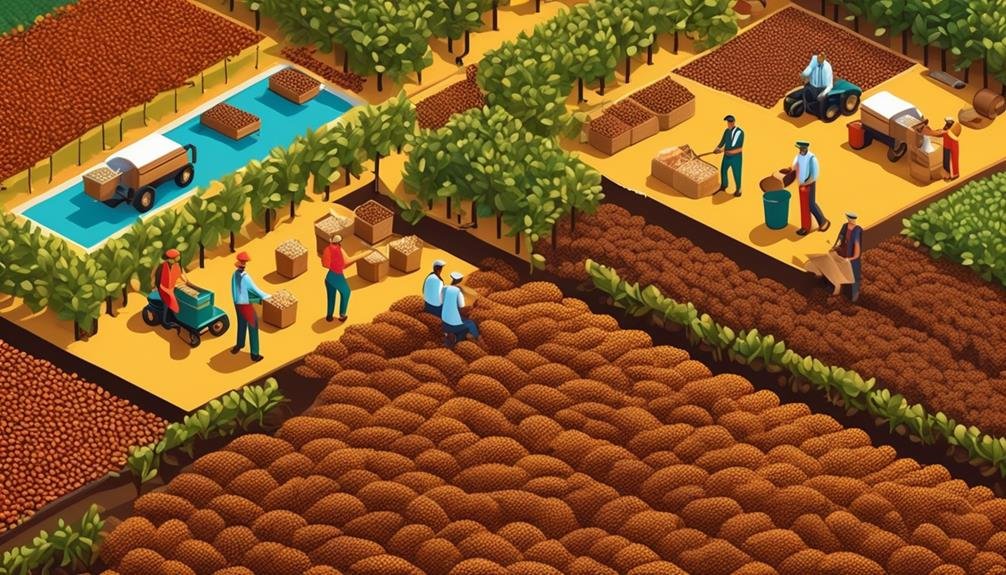Picture yourself standing in a bustling coffee shop, the aroma of freshly brewed coffee wafting through the air. As you glance at the menu, you notice two terms that catch your eye: direct trade and fair trade.
But what do these terms really mean? What sets them apart from each other? In this discussion, we'll explore the differences between direct trade and fair trade coffee, uncovering the intricacies of their sourcing practices, certification and standards, and the economic impact they have.
By the end, you'll have a deeper understanding of these two approaches to coffee production and be able to make a more informed choice about the type of coffee you sip each morning.
Key Takeaways
- Direct Trade focuses on direct relationships, transparency, and sustainability, while Fair Trade is a global movement for equity and sustainability.
- Direct Trade emphasizes transparency, long-term relationships, stability, collaboration, and quality, while Fair Trade focuses on fair prices, better working conditions, community support, sustainable practices, and ethical sourcing.
- Direct Trade sourcing practices involve building direct relationships, personal visits to farms, negotiating fair prices, collaboration for farming improvement, and prioritizing organic and eco-friendly practices. Fair Trade works with cooperatives and small-scale farmers, ensures fair prices, fosters long-term partnerships, encourages sustainable farming, and follows strict environmental standards.
- Direct Trade lacks standardized certification but may have a 'Direct Trade Certified' label by third-party organizations, while Fair Trade has a well-established certification system and emphasizes ethical sourcing, sustainable practices, transparency, and environmental sustainability.
Definition of Direct Trade
Direct trade is a sourcing model in the coffee industry that emphasizes a direct relationship between coffee producers and buyers, aiming to promote transparency, sustainability, and quality. This model is based on the idea that by eliminating intermediaries and establishing a direct connection between producers and buyers, it's possible to ensure a fair price for the farmers and to create mutually beneficial partnerships.
In a direct trade relationship, the buyer often visits the farms in person, developing a deep understanding of the production process and the challenges faced by the farmers. This allows for better communication and collaboration, resulting in a higher quality product.
One of the key principles of direct trade is transparency. Both the producer and the buyer are committed to open and honest communication about pricing, production methods, and social and environmental practices. This transparency allows consumers to make informed choices and supports the development of a sustainable coffee industry. By establishing long-term relationships with coffee producers, direct trade also promotes stability and enables farmers to invest in their farms and communities.
Furthermore, direct trade focuses on quality. Through close collaboration, buyers can work with farmers to improve growing and processing techniques, which ultimately results in better-tasting coffee. This emphasis on quality benefits both the producers and the consumers, as it allows for higher prices and a more enjoyable coffee-drinking experience.
Definition of Fair Trade
Fair trade is a global movement that aims to promote equity and sustainability in the coffee industry. It's a system that ensures fair prices for coffee farmers, provides better working conditions, and supports community development.
Here are three key aspects of fair trade:
- Fair prices: Fair trade guarantees that coffee farmers receive a minimum price for their beans, which covers the cost of production and provides a stable income. This protection helps to prevent exploitation and poverty among coffee growers.
- Worker rights: Fair trade ensures that coffee farmers and workers are treated fairly and have safe working conditions. It prohibits child labor and promotes gender equality. By adhering to fair trade standards, coffee producers create a more sustainable and ethical supply chain.
- Community support: Fair trade organizations invest in local communities to improve education, healthcare, and infrastructure. They also encourage environmentally sustainable practices, such as organic farming and biodiversity conservation. By supporting fair trade, consumers contribute to the overall well-being of coffee-producing communities.
Sourcing Practices in Direct Trade

After understanding the key aspects of fair trade, it's important to examine the sourcing practices employed in direct trade coffee. Direct trade coffee focuses on building direct relationships between coffee producers and buyers, bypassing middlemen and traditional supply chains. This allows for more transparency and control over the sourcing process.
In direct trade, coffee buyers often visit coffee farms personally to establish relationships with the producers. This enables them to understand the farming practices, the quality of the coffee, and the working conditions of the farmers. By working directly with the producers, buyers can negotiate prices that are fair and sustainable for both parties.
Direct trade also emphasizes quality. Buyers often work closely with producers to ensure that the coffee meets specific standards and preferences. This can involve providing technical support, sharing knowledge and expertise, and even offering financial assistance to improve farming practices and enhance the quality of the coffee.
Additionally, direct trade promotes environmental sustainability. Many direct trade coffee companies prioritize organic farming methods and invest in eco-friendly practices. This includes minimizing the use of pesticides and chemical fertilizers, conserving water resources, and implementing recycling and waste management systems.
Sourcing Practices in Fair Trade
To examine the sourcing practices in fair trade, one must delve into the methods employed by coffee buyers and producers to ensure ethical and sustainable supply chains. Fair trade organizations work closely with coffee cooperatives and small-scale farmers to create a fair and transparent trading system.
Here are some key aspects of fair trade sourcing practices:
- Price Transparency: Fair trade ensures that farmers receive a fair price for their coffee, which is often higher than the market price. This stability allows farmers to invest in their farms and communities.
- Long-Term Relationships: Fair trade fosters long-term partnerships between buyers and producers. This allows farmers to plan for the future, improve their farming practices, and receive technical support.
- Environmental Sustainability: Fair trade encourages sustainable farming practices, such as organic cultivation and biodiversity preservation. Farmers are required to follow strict environmental standards to protect their land and the surrounding ecosystems.
Certification and Standards in Direct Trade

In the realm of direct trade, certification and standards play a crucial role in ensuring ethical sourcing and sustainable practices are upheld throughout the coffee supply chain. Unlike fair trade coffee, which has a well-established certification system, direct trade lacks a standardized certification process. However, many direct trade companies have developed their own set of standards and certifications to address these concerns.
One commonly used certification in direct trade is the 'Direct Trade Certified' label, which is awarded by third-party organizations that assess and verify a company's commitment to ethical sourcing and sustainable practices. This certification ensures that coffee farmers are paid fair prices for their product, that environmental sustainability is prioritized, and that social and economic development initiatives are supported within the communities where the coffee is sourced.
Another important aspect of direct trade certification is traceability. Direct trade companies strive to provide transparency and traceability throughout the entire supply chain, from the coffee farm to the consumer's cup. This allows consumers to have confidence in the ethical and sustainable practices employed by the company and ensures that the coffee they're purchasing is truly direct trade.
While direct trade certification may not be as standardized as fair trade certification, it still plays a vital role in ensuring ethical sourcing and sustainable practices are upheld. By supporting direct trade certified coffee, consumers can make a positive impact on the lives of coffee farmers and contribute to a more sustainable coffee industry.
Certification and Standards in Fair Trade
With regards to certification and standards in fair trade coffee, it's imperative to understand the established system that ensures ethical sourcing and sustainable practices throughout the supply chain. Fair trade certification is a rigorous process that guarantees fair wages, safe working conditions, and environmental sustainability.
Here are three key aspects of the certification and standards in fair trade:
- Fair Pricing: Fair trade ensures that coffee farmers receive a fair price for their produce, which covers the cost of sustainable production and provides a decent livelihood. This price is determined through consultation with producers, taking into account their production costs and the local context.
- Social Standards: Fair trade certification includes strict social standards that protect the rights of workers. These standards prohibit child labor, forced labor, and discrimination. They also promote gender equality and support initiatives to improve education and healthcare in coffee-growing communities.
- Environmental Sustainability: Fair trade promotes sustainable farming practices by encouraging organic agriculture and prohibiting the use of harmful chemicals. Farmers are also encouraged to adopt eco-friendly practices such as water conservation, biodiversity protection, and soil fertility management.
Economic Impact of Direct Trade

Direct trade coffee has a significant impact on the economic sustainability of coffee farmers and their communities. By establishing direct relationships between coffee producers and buyers, this model aims to create a more equitable and transparent supply chain. Unlike fair trade, which focuses on ensuring fair wages and working conditions for farmers, direct trade goes a step further by prioritizing long-term partnerships, quality control, and community development.
One of the key economic benefits of direct trade is the potential for higher prices paid to farmers. By eliminating intermediaries and allowing direct negotiation, coffee producers can receive a larger share of the final sale price. This not only improves their income but also provides them with the financial resources to invest in their farms and communities.
To illustrate the economic impact of direct trade, consider the following table:
| Economic Impact of Direct Trade |
|---|
| Increased income for farmers |
| Investment in farm infrastructure |
| Community development projects |
| Enhanced quality control |
| Long-term partnerships |
Through direct trade, coffee farmers can earn higher incomes, which allows them to invest in improving their farms and infrastructure. This, in turn, leads to better coffee quality and increased production. Furthermore, direct trade often involves community development projects, such as building schools or healthcare facilities, which contribute to the overall well-being of the community. Finally, the establishment of long-term partnerships ensures stability and mutual growth for both the farmers and the buyers.
Economic Impact of Fair Trade
The economic impact of fair trade on coffee farmers and their communities is a topic of great importance and scrutiny. Fair trade aims to address the economic inequalities present in the coffee industry by ensuring that farmers receive fair prices for their produce. Here are three key aspects to consider when analyzing the economic impact of fair trade:
- Stable Income: Fair trade guarantees a minimum price for coffee, which provides farmers with a stable income even when market prices fluctuate. This stability allows farmers to plan for the future, invest in their farms, and improve their livelihoods.
- Community Development: Fair trade certification requires farmers to allocate a percentage of their earnings to community development projects. This investment supports initiatives such as education, healthcare, infrastructure development, and environmental sustainability. By investing in their communities, fair trade helps create a more prosperous and resilient society.
- Market Access: Fair trade connects farmers to global markets, eliminating intermediaries and allowing them to sell their coffee directly to buyers. This direct access provides farmers with greater bargaining power, enabling them to negotiate fairer trade terms and build long-term relationships with buyers.
Frequently Asked Questions
What Are the Environmental Practices Associated With Direct Trade and Fair Trade Coffee?
When it comes to environmental practices, both direct trade and fair trade coffee focus on sustainability. They prioritize organic farming methods, biodiversity conservation, and minimizing the use of harmful chemicals to protect ecosystems and promote a healthier planet.
How Do Direct Trade and Fair Trade Coffee Programs Ensure the Well-Being and Fair Treatment of Farmers and Workers?
Direct trade and fair trade coffee programs ensure the well-being and fair treatment of farmers and workers by adhering to transparent and ethical practices. They prioritize direct relationships, fair wages, safe working conditions, and sustainable farming methods.
Are There Any Differences in the Quality and Taste of Direct Trade and Fair Trade Coffee?
There may be differences in the quality and taste of direct trade and fair trade coffee due to variations in farming practices and sourcing. Direct trade emphasizes freshness and traceability, while fair trade focuses on social and environmental standards.
How Do Direct Trade and Fair Trade Coffee Programs Support the Local Communities Where Coffee Is Grown?
Direct trade and fair trade coffee programs support local communities where coffee is grown by providing fair wages, investing in infrastructure, and promoting sustainable farming practices. These initiatives help improve living conditions and empower farmers to have more control over their livelihoods.
What Are the Challenges and Limitations of Both Direct Trade and Fair Trade Coffee Systems?
The challenges and limitations of both direct trade and fair trade coffee systems include ensuring transparency, addressing power imbalances, and navigating complex supply chains. These systems strive to support local communities but face unique obstacles.
Conclusion
In conclusion, direct trade and fair trade coffee both aim to promote ethical sourcing practices and provide economic benefits to farmers. However, they differ in their approach.
Direct trade focuses on building direct relationships between farmers and buyers, while fair trade follows specific certification and standards.
Both methods have their own advantages and challenges, and ultimately, consumers have the power to make informed choices based on their values and preferences.




